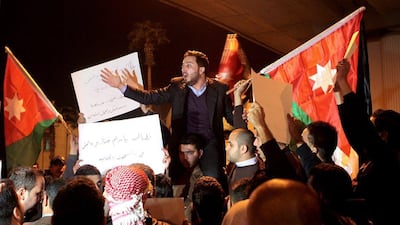The burning to death by ISIL of the Jordanian pilot Maaz Al Kassasbeh is a strategic mistake by the extremists.
The execution of a fellow Muslim in such a manner has been condemned even by those who sympathise with ISIL’s cause – such as Abu Sayyaf, the leader of the Jordanian Salafists, who criticised both the killing itself and the video footage broadcast on the internet.
ISIL had already lost many of its sympathisers when it beheaded Peter Kassig, an American aid worker who converted to Islam during his captivity. Before the murder of Al Kassasbeh, Jordanians were divided over their country's involvement in what many described as "someone else's war". Now, at least for the time being, they see ISIL as it truly is.
The burning of Al Kassasbeh, and the graphic publicity of the atrocious act, might also signal a new chapter in how Jordan deals with simmering extremism in its immediate neighbourhood and inside the country itself.
Indeed, Amman’s decision to take part in the US-led international coalition against ISIL could be viewed as a pre-emptive response to the heinous crime that was seen on Tuesday, rather than its cause – a case of getting your retaliation in first.
In an interview last summer, King Abdullah emphasised that the war against ISIL was Jordan's fight more than that of the United States.
Jordan’s military involvement was not a luxury to project power and please international allies. It was, as the king said, necessary: both to reclaim Islam from groups that claim to represent it, and to remove a growing cancer in the region.
The ecstasy and zeal that characterised how ISIL dealt with Al Kassasbeh should be seen in this context.
ISIL realises that when non-Muslim countries fight it, the group gains legitimacy, while the commitment of countries such as Jordan is what will potentially defeat it. When Al Kassasbeh's F-16 jet crashed, ISIL's supporters were over the moon. They saw an opportunity to inflict maximum pain on the "apostate" country.
Being a Muslim was never an advantage for the Jordanian pilot. On the contrary, one of the things that defines ISIL’s ideology, especially compared with that of Al Qaeda, is that it considers Muslims who oppose it to be more of a priority to kill and deter than non-Muslims.
For decades, Jordan has produced more than its share of radical figures who shaped the thinking of almost all the main terror groups in the region.
Abu Qatada and Abu Mohammed Al Maqdisi were ideologues for Al Qaeda, and Abdullah Azzam, a Palestinian-Jordanian, helped to found it. Abu Musab Al Zarqawi established the organisation that evolved into ISIL.
Jabhat Al Nusra’s leading cleric, Sami Al Oreidi, is Jordanian. Nevertheless, Jordan has successfully guarded itself against instability caused by extremism. It is the only country north of the Arabian Gulf states that does not have militias.
Jordan today has sympathisers with a range of extremist groups – Salafists, Al Qaeda and ISIL. The old policy of containment is not sustainable. These groups are acting in Jordan’s own security theatre and, while an organised militia operating out of Jordan is unlikely, the threat of low-level terrorist activities is high.
ISIL is a threat to everyone in the region: all countries would do well to get their retaliation in first.
Hassan Hassan is an analyst with the Delma Institute. His new book ISIS: Inside the Army of Terror, co-written with Michael Weiss, will be reviewed in The National’s The Review supplement on Saturday.

